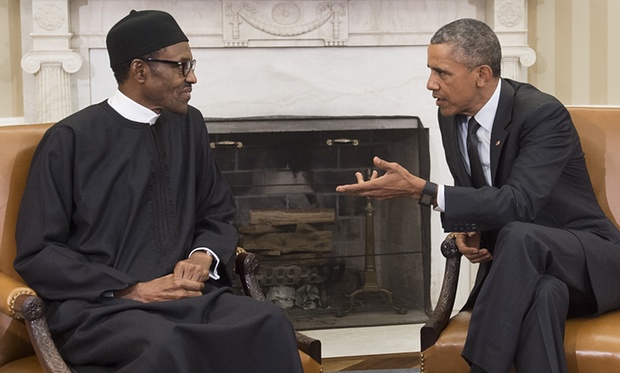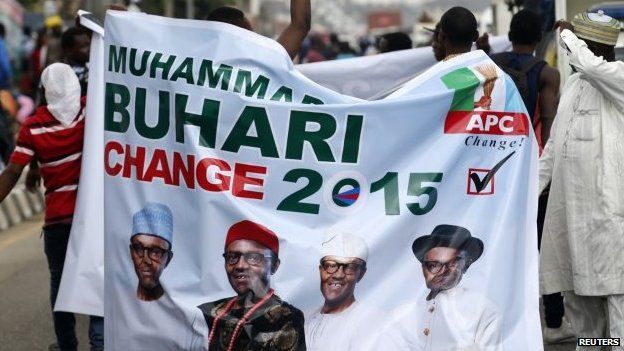Obama meets with new Nigerian president Muhammadu Buhari at the White House

BY JIBRIL TURE
Barely seven weeks after his May 29’s swearing-in, Nigerian president Muhammadu Buhari, at the invitation of U.S. president Barack Obama, started on Monday a four-day visit to the United States. After breakfast with Vice President Joe Biden, Buhari met with Obama at the White House on Monday.
Following the meeting, President Obama told reporters: “Nigeria is obviously one of the most important countries in the world and one of the most important countries in the African continent.” The president added:
“Recently we saw an election in which a peaceful transition to a new government took place, and it was an affirmation of Nigeria’s commitment to democracy, a recognition that although Nigeria is a big country and a diverse country with many different parts, nevertheless the people of Nigeria understand that only through a peaceful political process can change take place.”
These remarks clearly reflect the eagerness shown before the meeting by both countries to improve relations and shore up their cooperation that ground to a halt during the last several years of the Jonathan’s administration owing to the United States’ exasperation over the high level of corruption in the Nigerian army and across the Nigerian government and then-President Jonathan’s apparent reluctance to deal with it. The Obama administration was also frustrated over Jonathan’s nagging reluctance to take on the terrorist group Boko Haram. The Nigerian head of state turned down Washington’s offer to train the Nigerian military to fight the insurgency, preferring, instead, logistics.
Following this morning’s talks with Buhari, President Obama also stated his appreciation for the Nigerian leader’s agenda by remarking that he has
“a very clear agenda in defeating Boko Haram and extremists of all sorts inside of his country. And he has a very clear agenda in terms of rooting out the corruption that too often has held back the economic growth and prosperity of his country.”
You may also want to read: Buhari expected to take Nigeria (and Africa) to a better destination
During the presidential campaign, Buhari, who eventually beat Jonathan by a sizable margin this past March, made clear one of his primary goals as president would be to end the insurgency—now in its sixth year—that has claimed so far an estimated 15,000 lives and caused nearly 2 million displaced people.
But, after it appeared the terrorist organization had been weakened after being driven out of the cities it had seized across the northeastern region by the regional task force comprising Nigeria, Chad, Cameroon and Niger that became operational during the last several weeks of the Jonathan’s administration, it launched in recent weeks several attacks, including some really vicious ones. This prompted Buhari on July 13 to fire the entire top echelon of the military he has accused of corruption, which, U.S. officials stated, clears the way for more military cooperation.
According to the Reuters news agency, since Buhari assumed office, the United States has committed an additional $5 million for the multi-national task force on top of the $34 million it has previously provided.
You may also want to read: John Kerry heads U.S. delegation at President Buhari’s inauguration
While the insurgency is the top concern, there is more to better relations between the United States and Nigeria, the leading oil-producing country in Africa, the largest economy on the continent with a GDP of $521.8 billion according to the 2013 estimates, not to mention its population estimated at 178,516,904 as of July 1, 2014. With now cool relations with its other two strategic allies in Africa, Egypt and South Africa, the United States needs to strengthen ties with Nigeria.
Johnie Carson, formerly Assistant Secretary of State for African Affairs, now an advisor to the U.S. Institute of Peace, put it bluntly: “Nigeria is the most important country in Africa.” Carson therefore advocates for closer trade and investment ties with Nigeria, something the West African giant needs to meet the challenges of sharply decreased revenue stemming from lower oil prices. An economically healthy Nigeria, the U.S. biggest trading partner in Africa, is in the strategic interest of the United States.
You may also want to read: Why Obama’s “interference” in the recent Nigerian presidential election
Buhari, reportedly the only Nigerian leader not to have enriched himself from state coffers, hammered out in his inaugural speech on May 29:
“With depleted foreign reserves, falling oil prices, leakages and debts, the Nigerian economy is in deep trouble and will require careful management to bring it round and to tackle the immediate challenges confronting us.”
According to several news reports, the new president is focused on recovering money siphoned away by his corrupt fellow-countrymen, an area where the United States, which is credited with helping recover whopping $480 stashed away by the former dictator Sani Abacha in foreign banks, is said to be willing to assist the new president whose visit to Washington is his first since he assumed office amid hope he will deliver on his promise of change.
Buhari also met Monday with members of the U.S. Congress, before meeting later with the African diplomatic community in Washington. He is scheduled to meet with members of the Nigerian community in the United States Tuesday.
_____________
Field correspondent Modupe Abiola contributed to this report.



